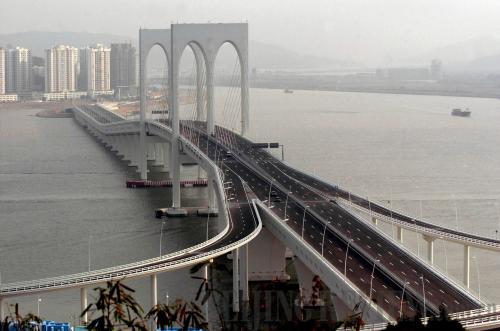|
Central Government's support
The potential of Macao's tourism market was unleashed by a 2003 policy created by the Central Government, which allowed travelers from the mainland to visit Hong Kong and Macao on an individual basis. Prior to this "individual visit scheme," residents of some provinces and cities on the mainland could only travel on business visas or with group tours. In 2003, the Chinese mainland for the first time surpassed Hong Kong to become Macao's No.1 source of tourists. In 2007, amid a rise of gambling-related crimes, the Central Government restricted the visa arrangement for mainland residents traveling to Macao by limiting their trips to Macao in a year. In 2008, 11.6 million mainland residents visited Macao, comprising nearly 51 percent of all tourists to the area. More than half of mainland tourists traveled under the individual visit scheme.
 |
|
BRIDGE TO FORTUNE: The West Bay Bridge, which stretches 2,200 meters, is Macao's third that links the Macao Peninsula to the region's Taipa Island, on December 17, 2004 (XINHUA) | "China's overall fast economic growth and improvements in living standards over the last 10 years have strongly boosted Macao's economic growth, with more and more mainland residents traveling, shopping and investing in real estate in Macao," said the chief executive.
In an effort to shore up Macao's gaming-centered economy in the face of the global financial crisis, the Central Government added Supplement VI to CEPA, which was signed this May. The annex cleared the way for mainland residents traveling to Taiwan with group tours to enter Macao in transit.
In January, the National Development and Reform Commission issued its 2008-20 plan for the Pearl River Delta, involving nine cities in southern Guangdong Province and the SARs of Hong Kong and Macao. The plan states that cities in the delta area will cooperate with each other to build "a highly dynamic area in the Asia-Pacific region" by 2020. Macao will become a world-class recreation and tourism center as part of the plan.
"The release of such a development plan has provided Macao with an opportunity to intensify its cooperation with Guangdong and Hong Kong," said Fernando Chui Sai On, Macao's next chief executive, who will take office on December 20. Chui said the new administration would promote Macao's cooperation with Guangdong and Hong Kong in logistics, traditional Chinese medicine, the creative industry and tourism to diversify its economic structure.
With a land area of less than 30 square km, a lack of space has created a bottleneck for Macao's development. In a June press conference, the SAR chief executive announced Macao had received a "generous gift" from the Central Government, which gave its approval for the University of Macau (UM) to build a new campus on a piece of land that had been leased on Hengqin Island. The island belongs to neighboring Zhuhai City in the mainland province of Guangdong.
Zhao Wei, Rector of the Macao SAR Government-funded university, said the problem of land scarcity that has hindered his institution's development would be solved with the construction of its new campus. In June, the Standing Committee of the National People's Congress passed a bill that authorized Macao SAR to incorporate the new campus on Hengqin Island under its jurisdiction.
"When it is completed in three years, we will finally have a real campus and be able to set up our long-needed biological department," said Zhao. He said the new campus will be built on approximately 1 square km of land, which is 20 times larger than UM's current home.
In November, the State Council approved the Macao SAR Government's 3.61-square-km land reclamation project, which will increase the region's land area by more than 12 percent. A Macao SAR Government statement said the new project would create more public facilities and green spaces, along with setting aside plots of land for public housing projects and the development of business parks.
Macao in Figures (2008)
Population: 549,200
Land Area: 29.2 square km
Per-capita GDP: $39,036
Gaming Industry Income: MOP111.1 billion ($13.89 billion)
Total Visitor Arrivals: 22.9 million
Source: Macao SAR Government Portal |
